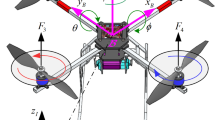Abstract
In this paper, an intelligent and robust control approach is used for the control of a highly nonlinear quadcopter. A sliding mode controller is designed for both altitude and attitude control of the quadcopter. The switching gain of the sliding mode controller is tuned based on the fuzzy control technique. Rule base of the fuzzy logic controller is designed based on vast simulation and stability of the designed algorithm is shown. Mathematical derivations for roll pitch, yaw and altitude control is shown step by step. Different uncertain conditions are simulated by taking random disturbances and robustness under uncertain condition are guaranteed with the fuzzy sliding mode control technique. Simulation results show that the designed control algorithm works satisfactorily for both altitude and attitude control. Qualitative analysis is done for the performance of the designed fuzzy sliding mode controller. Finally, trajectory tracking of the quadcopter with attitude control is done.
Access this chapter
Tax calculation will be finalised at checkout
Purchases are for personal use only
Similar content being viewed by others
References
Wang N, Deng Q (2018) Finite-time disturbance observer based integral sliding mode control of a quadrotor. In: Proceedings—2018 33rd youth academic annual conference of Chinese association of automation, YAC 2018, pp 956–960
Zhao B, Tang Y, Wu C, Wu W (2018) Vision-based tracking control of quadrotor with backstepping sliding mode control. IEEE Access 6:72439–72448
Rios H, Falcon R, Gonzalez OA, Dzul A (2019) Continuous sliding-mode control strategies for quadrotor robust tracking: real-time application. IEEE Trans Industr Electron 66(2):1264–1272
Ruiz AGE, Alazki H, Rubio JEV, Salazar OG (2016) Embedded super twisting control for the attitude of a Quadrotor. IEEE Latin Am Trans 14(9):3974–3979
Huang Y, Zheng Z, Sun L, Zhu M (2018) Saturated adaptive sliding mode control for autonomous vessel landing of a quadrotor. IET Control Theory Appl 12(13):1830–1842
Fethalla N, Saad M, Michalska H, Ghommam J (2018) Robust observer-based dynamic sliding mode controller for a quadrotor UAV. IEEE access, 6(Dcm):45846–45859
Fang Z, Zhang Z, Jim L, Jian W (2008) Feedback linearization and continuous sliding mode control for a quarotor UAV. In: Proceedings of the 27th Chinese control conference, CCC, pp 349–353
Nguyen NT, Prodan I, Lefevre L (2017) Multi-layer optimization-based control design for quadcopter trajectory tracking. In: 2017 25th mediterranean conference on control and automation, MED 2017, pp 601–606
Sardar S, Kadri MB (2015) Autonomous control of a quadcopter via fuzzy gain scheduled PD control. In: Proceedings—12th international conference on frontiers of information technology, FIT 2014, pp 73–78
Tang Y, Zhang H, Gong J (2016) Adaptive-fuzzy sliding-mode control for the attitude system of a quadrotor. In: Proceedings—2015 Chinese automation congress, CAC 2015, pp 1075–1079
Santoso F, Garratt MA, Anavatti SG (2016) Fuzzy logic-based self-tuning autopilots for trajectory tracking of a low-cost quadcopter: a comparative study. In: ICAMIMIA 2015—international conference on advanced mechatronics, intelligent manufacture, and industrial automation, proceeding—in conjunction with industrial mechatronics and automation exhibition, IMAE, pp 64–69
Gao W, Wang Y, Homaifa A (1995) Discrete-time variable structure control systems. IEEE Trans Industr Electron 42(2):117–122
Deia Y, Kidouche M, Ahriche A (2016) Fully decentralized fuzzy sliding mode control with chattering elimination for a Quadrotor attitude. In: 2015 4th international conference on electrical engineering, ICEE 2015, pp 1–6
Huaman-Loayza AS (2018) Path-following of a quadrotor using fuzzy sliding mode control. In: 2018 IEEE XXV international conference on electronics, electrical engineering and computing (INTERCON), pp 1–4
Author information
Authors and Affiliations
Corresponding author
Editor information
Editors and Affiliations
Rights and permissions
Copyright information
© 2020 Springer Nature Switzerland AG
About this paper
Cite this paper
Samantaray, J., Chakrabarty, S. (2020). A Fuzzy Sliding Mode Control Design for Quadcopter. In: Jain, K., Khoshelham, K., Zhu, X., Tiwari, A. (eds) Proceedings of UASG 2019. UASG 2019. Lecture Notes in Civil Engineering, vol 51. Springer, Cham. https://doi.org/10.1007/978-3-030-37393-1_17
Download citation
DOI: https://doi.org/10.1007/978-3-030-37393-1_17
Published:
Publisher Name: Springer, Cham
Print ISBN: 978-3-030-37392-4
Online ISBN: 978-3-030-37393-1
eBook Packages: EngineeringEngineering (R0)




